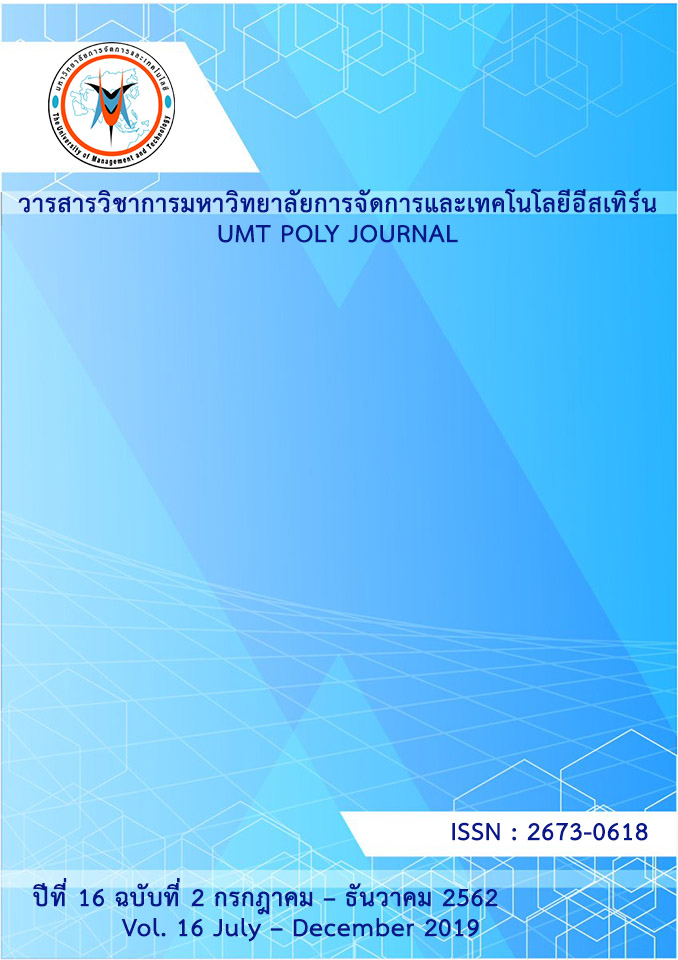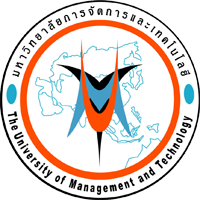Non –English Major Undergraduate Students’ Perception towards Using Drama to Overcome Foreign Language Classroom Anxiety: A Case of Thai – Nichi Institute of Technology
คำสำคัญ:
ความกังวล, ความกังวลในชั้นเรียนภาษาต่างประเทศ, ละคร, นักศึกษาระดับปริญญาตรีทีไม่ใช่วิชาเอกภาษาอังกฤษบทคัดย่อ
Non-native speakers (NNS) always show reluctance when they have to speak in English. We can say that they suffer the anxiety to express themselves in a foreign language. The fear or anxiety from real or expected communication by a student with another person or group has been defined as Foreign Language Anxiety (FLA). The purposes of the study were 1) to investigate the students’ attitude of Thai undergraduates who were not in an English major course towards drama related activities in class at Thai-Nichi Institute of Technology and 2) to identify the students’ perception towards the impacts of using drama presentation on students’ ForeignLanguage Classroom Anxiety Level at Thai-Nichi Institute of Technology. The samples were 30 first year students who studied an English Foundation Course and came from different faculties at TNI in the first semester of the academic year 2018. All of them were non - English major students and they were selected for purposive sampling based on the class assigned for the researcher by the university registrar’s office. The data was collected through a survey questionnaire. The results of the research indicated that the students regarded drama as a fun activity. They did not feel any anxiety during the drama class. Moreover, they felt more relaxed when they spoke English in front of people after several weeks of drama training.
Downloads
เอกสารอ้างอิง
Bundit, P. (2001).The Effectiveness of Drama Techniques on Foreign Language Classroom Anxiety Reduction of Thai EFL Students. Bangkok: Graduate School. Srinakharinwirot University. Photocopied.
Horwitz, E.K., Horwitz, M.B., & Cope, J. (1986). Foreign Language Classroom Anxiety. The Modern Language Journal, 31 (2), 165-180.
Jong-Utsah, K. (1988). A level of English Speaking Ability of Students at the Lower Secondary Education Level. Bangkok: Graduate School. Chulalongkorn University. Photocopied.
Kitjaroonchai, N. (2012). Motivation toward English Language Learning of Students in Secondary and High School in Education Service Area Office 4, Saraburi Province, Thailand. International Journal of Language and Linguistics 1 (1): 22-33.
Lui, M. & Jackson, J. (2008). An Exploration of Chinese EFL Learners’ Unwillingness to Communicate and Foreign Language Anxiety. TheModern Language Journal,6 (1), 67-68.
Nunan, D. (2001). Second Language Acquisition. Cambridge: Cambridge University Press.
Pattaranon, S. (1988). A Level of English Speaking Ability of Students at the Upper Secondary Education Level. Bangkok: Graduate School. Srinakharinwirot University. Photocopied.
Rachman, S. (1998). Anxiety, Have, East Sussex. UK: Psychology Press.
Ratchadaporn, P., &Punchalee, W. (2009). Drama and Questioning Techniques: Powerful Tools for the Enhancement of Students’ Speaking Ability and Positive Attitudes towards EFL Learning. ESP WORLD, 6 (32), Volume 8 2009 1-18.
Shand, J.W. (2008). The Use of Drama to Reduce Anxiety and Increase Confidence. EnglewoodCliffs, New Jersey: Prentice Hall.
Stinson, M., &Freebody, K. (2006). Drama and Oral language. BritishJournal of Education Psychology 5 (4), 161-170. Retrieved August 08, 2017, from https://doi.org/10.1515/irl.2001.5.1-4.16.
Wagner, B. J. (1998). Educational Drama and Language Arts: What Research Shows.Portsmouth, NH: Heinemann.
ดาวน์โหลด
เผยแพร่แล้ว
ฉบับ
ประเภทบทความ
สัญญาอนุญาต
ประกาศลิขสิทธิ์
เนื้อหาและข้อมูลในบทความที่ลงตีพิมพ์ในวารสารวิชาการมหาวิทยาลัยการจัดการและเทคโนโลยีอีสเทิร์น ถือเป็นข้อคิดเห็นและความรับผิดชอบของผู้เขียนบทความโดยตรง ซึ่งกองบรรณาธิการวารสารไม่จำเป็นต้องเห็นด้วยหรือร่วมรับผิดชอบใด ๆ
บทความ ข้อมูล เนื้อหาหรือรูปภาพ ฯลฯ ที่ได้รับการตีพิมพ์ในวารสารวิชาการมหาวิทยาลัยการจัดการและเทคโนโลยีอีสเทิร์น ถือเป็นลิขสิทธิ์ของวารสารวิชาการมหาวิทยาลัยการจัดการและเทคโนโลยีอีสเทิร์น หากบุคคลหรือหน่วยงานใดต้องการนำข้อมูลทั้งหมดหรือบางส่วนไปเผยแพร่ต่อหรือเพื่อกระทำการใด ๆ จะต้องได้รับอนุญาตเป็นลายลักษณ์อักษรจากวารสารวิชาการมหาวิทยาลัยการจัดการและเทคโนโลยีอีสเทิร์นก่อนเท่านั้น




